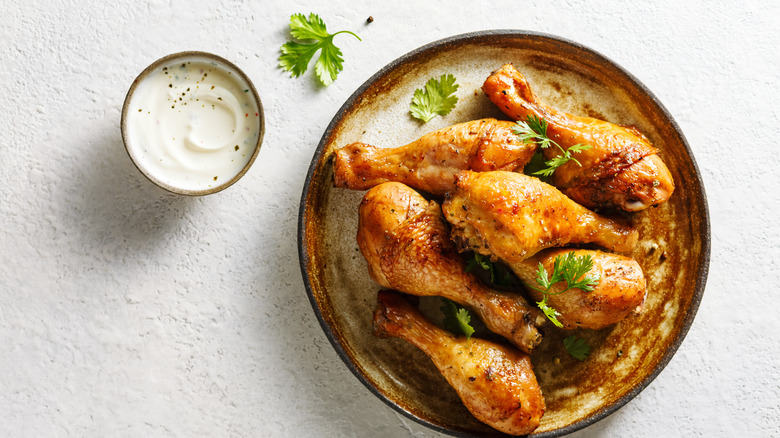The Chicken Rule You Should Break, According To Kelsey Barnard Clark
When it comes to proteins, chicken is one of the most commonly used by many home cooks, yet it can be a bit tough to master. Boneless, skinless chicken breast has a bit of a reputation for being dry and tasteless, and they require a bit of extra love to really keep that moisture locked in there (via The Kitchn). Luckily, Kelsey Barnard Clark, the winner of season 16 of "Top Chef," has one particular rule that all home cooks should break if they want juicy, tasty proteins — and it just involves making an adjustment to the temperature.
According to Clark, most people cook protein like chicken at a temperature that is far too low, for far too long (via Brit.co). While the low and slow method can work for some things, like braising meats or getting incredibly tender roast in your slow cooker, it isn't always the best solution. Instead, Clark recommends cranking the heat up higher than you normally would. Rather than sticking it in the oven at the standard 350 degrees Fahrenheit, she suggests increasing the temperature to 415 degrees Fahrenheit for chicken in order to obtain brown, crispy skin and a moist, juicy interior. As an added bonus for busy home cooks, a higher temperature generally means less time, so you can get your quick and easy dinner on the table in no time at all!
A few more tips for juicy chicken
Okay, you've cranked up your oven temperature to something over 400 degrees Fahrenheit, as Clark suggested — but what else can you do to ensure your chicken ends up delectably moist rather than undesirably dry? First of all, particularly for relatively low-fat proteins like chicken breast, start by adding some fat — there's a reason that so many roast chicken and turkey recipes involve rubbing butter under the skin in order to get that fat into the protein (via Foodie Crush). There are certain other ingredients that can help deliver a burst of moisture, such as a sliced lemon in the protein's cavity.
Additionally, don't feel like you need to babysit your chicken and constantly baste it every fifteen minutes in order to get a crispy on the outside, tender on the inside roasted chicken. In fact, as chef Thomas Keller told Epicurious, this process may just end up creating a bit of extra steam that won't really impact your bird. He recommends just leaving your protein in that oven with the heat cranked high, undisturbed, and only doing a quick baste at the end to really lock in those juices.

